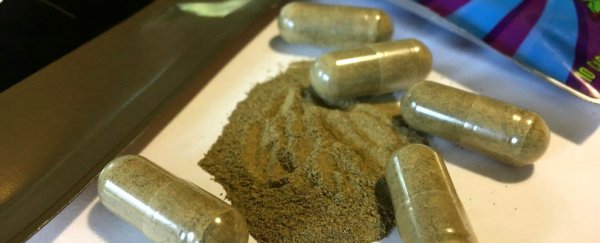The Centers for Disease Control and Prevention, the Food and Drug Administration, and several states are investigating an outbreak of salmonella illness linked to kratom, an unregulated herbal supplement that is sometimes used for pain, anxiety and opioid-withdrawal symptoms, the CDC said Tuesday.
The agency, which urged consumers to not use kratom in any form because of the possibility of contamination, said the infections started in October and have affected 20 states. Eleven people have been hospitalized, and no one has died.
Most of the people sickened have reported consuming kratom in pills, powder or tea, according to the CDC, which didn't name any specific brands or suppliers.
Symptoms of a salmonella infection include diarrhea, fever and abdominal cramps. The CDC said that whole genome sequencing performed on salmonella samples from ill people showed that the germs were closely related genetically, making it likely they came from a common source.
Three people in California have been sickened; the other affected states, including Utah, Oregon, Ohio and Pennsylvania, have had one or two cases.
Kratom, which comes from a tree in Southeast Asia, is at the center of a fierce debate over whether it should be banned. In 2016, the Drug Enforcement Administration tried to classify kratom in the same category as heroin but backed off after an intense public backlash.
Recently, the FDA has supported a kratom crackdown, saying the botanical is potentially dangerous and addictive. The DEA is reviewing the FDA's recommendation and conducting its own analysis.
Kratom is widely available on the Internet and is sold in some head shops, gas stations and corner grocery stores. It has been banned for sale and possession in at least five states and in several cities, including Washington and San Diego.
The FDA said recently that a new computer model it developed shows that kratom contains opioid compounds that can cause potentially lethal side effects such as seizures and depressed breathing.
The agency said there is no evidence that kratom is safe for any medical use, including for the treatment of opioid-withdrawal symptoms.
Kratom advocates have attacked the FDA's views, saying the supplement is much safer than traditional opioids such as oxycodone and can help addicts wean themselves off the powerful painkillers.
The American Kratom Association, which promotes access to the herb, is launching an online campaign this week, using the slogan #IamKratom, to increase support.
Earlier this month, the group sent a letter to the White House from several scientists calling the FDA's warnings a "disinformation campaign."
2018 © The Washington Post
This article was originally published by The Washington Post.
